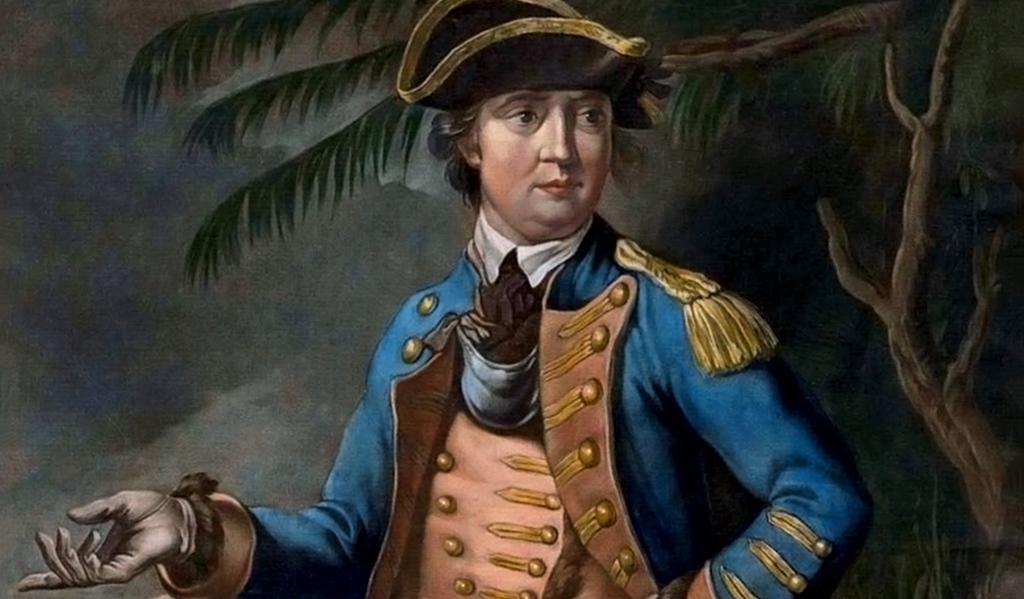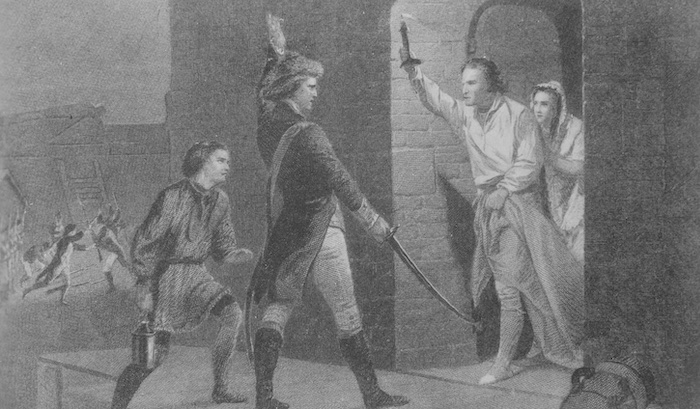American schoolchildren learn about Ethan Allen’s 1775 seizure of Fort Ticonderoga, an important moment early in the Revolutionary War. What’s less commonly talked about is that the man who’d go on to be the war’s most famous traitor almost botched the whole thing. Right when Allen was about to start the operation, Connecticut businessman Benedict Arnold barged in with a piece of paper from Massachusetts, claiming to anyone who would listen that he was in charge. The incident makes terrific inspiration for a complication in a battlefield adventure!
This post is brought to you by beloved Patreon backer Arthur Brown. Thanks for helping keep the lights on! If you want to help keep this blog going alongside Arthur, head over to the Patreon page – and thank you!

Let’s briefly cover the Fort Ticonderoga raid. The fort lies on Lake Champlain, and controlled the primary overland route between the rebellious colonies and Quebec. It was astonishingly well-built and formidable, and full of cannons the American rebels coveted. It was also severely undermanned. It was an obvious target.
Ethan Allen led a militia called the Green Mountain Boys based in the area that is today Vermont, but was at the time disputed between New York and New Hampshire. The Green Mountain boys had tangled with the governments of both colonies, but they hated the British more. When war began at the battles of Lexington and Concord, Ethan Allen rounded up his militia to launch a surprise attack on Fort Ticonderoga.
The attack had to come before the fort’s defenders learned that war had begun. If the garrison knew to expect trouble, they’d find defending the fort trivially easy. Allen had to get his troops to the fort without anyone noticing – and fast! The militia traveled in small groups, scouted the fort, and rendezvoused nearby.
The idea to take Ticonderoga came, in a roundabout way, from Connecticut businessman and militia captain Benedict Arnold. Arnold had held a conversation with Samuel Parsons, another Connecticut rebel, about their need for cannons, and Arnold had pointed out that there were cannons aplenty at Fort Ticonderoga. Both men went their separate ways, but Parsons brought it up with some Connecticut leaders who sponsored the money and coordination for Allen’s attack on the fort.
While all this was happening, Arnold was separately and independently pressing leaders in Massachusetts to launch such an attack, with him in charge. Massachusetts gave Arnold a colonel’s commission in the militia and authorization for funding, gunpowder, and manpower. But Arnold knew Ethan Allen was gearing up to launch the expedition without him. He left Massachusetts with no money, no gunpowder, and no army (just a single aide) to take command of Allen’s operation.
Arnold reached the Green Mountain Boys mere hours before the attack was to take place. He demanded that Ethan Allen surrender command of the operation to him. Allen was in a bind. He had no formal officer’s commission. His guys just trusted and followed him. Arnold held a commission as a colonel in the Massachusetts militia. The Revolution was just getting started, but the rebels were trying to create and maintain a legal structure for their actions. In that framework, Arnold should be in charge. That said, they weren’t actually in Massachusetts, Arnold’s commission only gave him legal authority over Massachusetts troops, and Allen’s men were sworn to follow Allen, not Arnold. When Allen floated the idea of Arnold taking over to the men, they made it very clear they would only follow Allen. If Allen surrendered his command, they’d just go home. But Allen didn’t want to offend Arnold, an influential and wealthy man.
Allen decided to cut a deal with Arnold. Arnold could join the expedition as “a volunteer officer,” serving at Allen’s “left side.” That way, Arnold could get some of the prestige of leading the assault, but nobody actually reported to him. Indeed, Allen’s men generally ignored Arnold through the assault on the fort. Arnold later tried to inflate his involvement in the attack, writing to the Continental Congress that he and Allen “agreed we should take a joint command of the troops.”
Arnold’s glory-hounding endangered the mission. The fact that the rebels ultimately took Fort Ticonderoga without any serious injuries (on either side) was despite Arnold’s last-minute antics. Command and control are sensitive things; injecting ambiguity into the chain of command can be disastrous. Allen didn’t help matters much by publicly considering handing over command to Arnold. What if the attack had turned violent and Arnold started issuing orders out of earshot of Allen? It would not be clear to those around him whether those orders actually carried any weight – whether they actually ought to be followed. Allen could have been elsewhere in the fighting, unaware that Arnold was doing something totally unexpected elsewhere in the battle. The capture of the fort didn’t work out this way, but it easily could have.

This is part twelve in my ongoing PCs on the Battlefield series, focusing on small moments where the actions of individual PCs could change the course of an entire battle. At your table, if your PCs are about to be involved in a sensitive or dicey military operation, a fictionalized version of the Arnold situation would make a great complication. On the eve of the operation kicking off, somebody shows up in camp saying they’re here to take over. No one was expecting them. No one knows or likes them. But they hold something setting-appropriate that gives them some sort of claim on the operation. Maybe the mission is being carried out in their jurisdictional region. Maybe they’re from a prestigious religious order or military fraternity. Maybe they’re well-connected and could cause trouble if not given their way. Maybe they’re a much higher military rank or from a higher social class.
It’s up to the PCs to mediate the dispute between the two rival commanders. Can they convince one to step back? Can they gin up a compromise that doesn’t risk battlefield disaster?
–
Make sure you don’t miss a blog post by subscribing to my no-frills, every-other-week mailing list! I also have a signup that’s only for big product releases!
Looking for material for your game tonight? My back catalog has hundreds of great posts, all searchable and filterable so you can find something from real history or folklore that fits exactly what you need! Posts older than a year are behind a very cheap paywall – only $2/month!
Come follow and chat with me on social media! On Mastodon I’m @MoltenSulfur@dice.camp. On Twitter, I’m @moltensulfur. On Blue Sky, I’m @moltensulfur.bsky.social.
Enjoy this post? Consider sharing it on social media, or maybe emailing it to a GM friend of yours. The social media infrastructure that creators relied upon to grow their audiences is collapsing. You sharing my stuff helps me stay relevant and ultimately helps me get paid for my time.
Sing and fight magical folk ballads in 1813 England and Scotland! This free early-access edition has everything you need to play a Ballad Hunters one-shot about the traditional song Barbara Allen.
The game has:
– Investigative adventures centered around the lyrics of traditional British ballads
– Simple, story-driven rules inspired by the GUMSHOE engine
– A historical setting that is grim but hopeful
– Magic where characters make ballad verses come to life
Ballad Hunters is the sequel to Shanty Hunters, winner of a 2022 Ennie Award (Judge’s Choice) and nominee at the Indie Groundbreaker Awards for Most Innovative and Game of the Year.
You can download the free early-access version of the game from DriveThruRPG or Google Drive.
Source: Special Operations in the American Revolution by Robert L. Tonsetic (2013)







